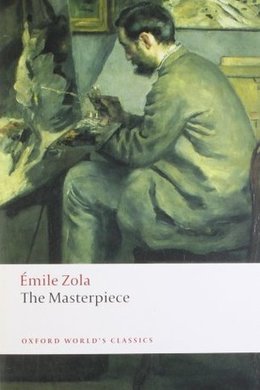
-
EPUB 430 KB
-
Kindle 606 KB
-
Support epubBooks by making a small $2.99 PayPal donation purchase.
Description
The Masterpiece is the tragic story of Claude Lantier, an ambitious and talented young artist who has come from the provinces to conquer Paris but is conquered instead by the flaws of his own genius. Set in the 1860s and 1870s, it is the most autobiographical of the twenty novels in Zola’s Rougon-Macquart series. It provides a unique insight into Zola’s career as a writer and his relationship with Cezanne, a friend since their schooldays in Aix-en-Provence. It also presents a well-documented account of the turbulent Bohemian world in which the Impressionists came to prominence despite the conservatism of the Academy and the ridicule of the general public.
577 pages with a reading time of ~9 hours (144493 words), and first published in 1886. This DRM-Free edition published by epubBooks, 2015.
Community Reviews
There are currently no other reviews for this book.
Excerpt
Claude was passing in front of the Hotel de Ville, and the clock was striking two o’clock in the morning when the storm burst forth. He had been roaming forgetfully about the Central Markets, during that burning July night, like a loitering artist enamoured of nocturnal Paris. Suddenly the raindrops came down, so large and thick, that he took to his heels and rushed, wildly bewildered, along the Quai de la Greve. But on reaching the Pont Louis Philippe he pulled up, ragefully breathless; he considered this fear of the rain to be idiotic; and so amid the pitch-like darkness, under the lashing shower which drowned the gas-jets, he crossed the bridge slowly, with his hands dangling by his side.
He had only a few more steps to go. As he was turning on to the Quai Bourbon, on the Isle of St. Louis, a sharp flash of lightning illumined the straight, monotonous line of old houses bordering the narrow road in front of the Seine. It blazed upon the panes of the high, shutterless windows, showing up the melancholy frontages of the old-fashioned dwellings in all their details; here a stone balcony, there the railing of a terrace, and there a garland sculptured on a frieze. The painter had his studio close by, under the eaves of the old Hotel du Martoy, nearly at the corner of the Rue de la Femme-sans-Tete.* So he went on while the quay, after flashing forth for a moment, relapsed into darkness, and a terrible thunder-clap shook the drowsy quarter.
- The street of the Headless woman.–ED.
When Claude, blinded by the rain, got to his door–a low, rounded door, studded with iron–he fumbled for the bell knob, and he was exceedingly surprised–indeed, he started–on finding a living, breathing body huddled against the woodwork. Then, by the light of a second flash, he perceived a tall young girl, dressed in black, and drenched already, who was shivering with fear. When a second thunder-clap had shaken both of them, Claude exclaimed:
‘How you frighten one! Who are you, and what do you want?’
He could no longer see her; he only heard her sob, and stammer:
‘Oh, monsieur, don’t hurt me. It’s the fault of the driver, whom I hired at the station, and who left me at this door, after ill-treating me. Yes, a train ran off the rails, near Nevers. We were four hours late, and a person who was to wait for me had gone. Oh, dear me; I have never been in Paris before, and I don’t know where I am….’
Another blinding flash cut her short, and with dilated eyes she stared, terror-stricken, at that part of the strange capital, that violet-tinted apparition of a fantastic city. The rain had ceased falling. On the opposite bank of the Seine was the Quai des Ormes, with its small grey houses variegated below by the woodwork of their shops and with their irregular roofs boldly outlined above, while the horizon suddenly became clear on the left as far as the blue slate eaves of the Hotel de Ville, and on the right as far as the leaden-hued dome of St. Paul. What startled her most of all, however, was the hollow of the stream, the deep gap in which the Seine flowed, black and turgid, from the heavy piles of the Pont Marie, to the light arches of the new Pont Louis Philippe. Strange masses peopled the river, a sleeping flotilla of small boats and yawls, a floating washhouse, and a dredger moored to the quay. Then, farther down, against the other bank, were lighters, laden with coals, and barges full of mill stone, dominated as it were by the gigantic arm of a steam crane. But, suddenly, everything disappeared again.
Claude had an instinctive distrust of women–that story of an accident, of a belated train and a brutal cabman, seemed to him a ridiculous invention. At the second thunder-clap the girl had shrunk farther still into her corner, absolutely terrified.
‘But you cannot stop here all night,’ he said.
She sobbed still more and stammered, ‘I beseech you, monsieur, take me to Passy. That’s where I was going.’
He shrugged his shoulders. Did she take him for a fool? Mechanically, however, he turned towards the Quai des Celestins, where there was a cabstand. Not the faintest glimmer of a lamp to be seen.
‘To Passy, my dear? Why not to Versailles? Where do you think one can pick up a cab at this time of night, and in such weather?’
